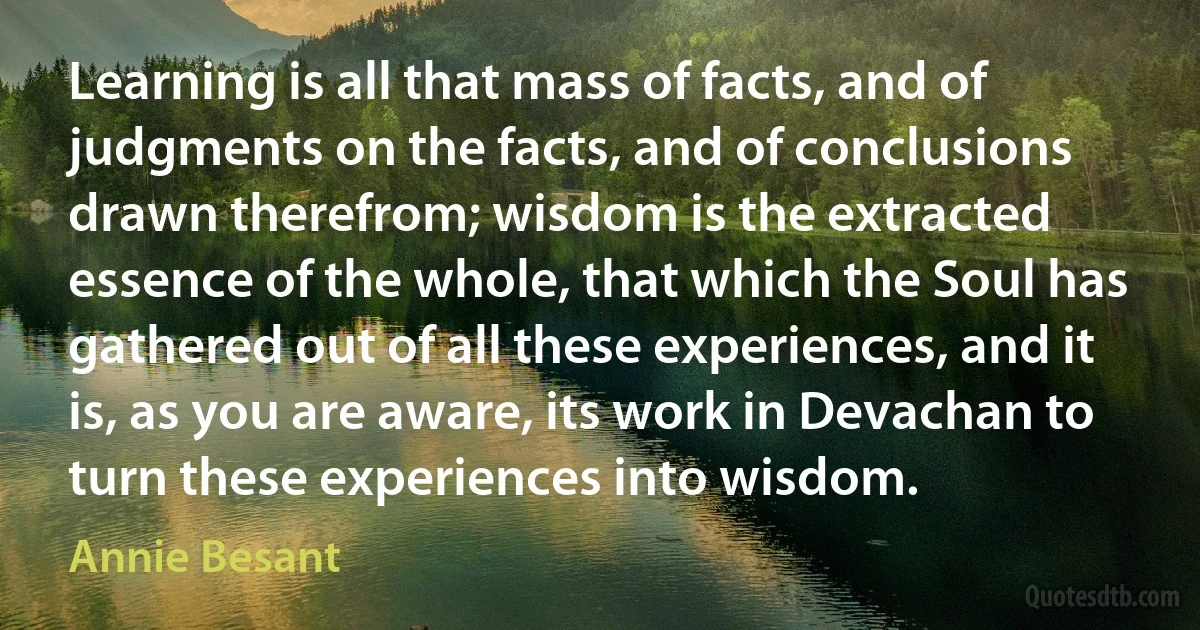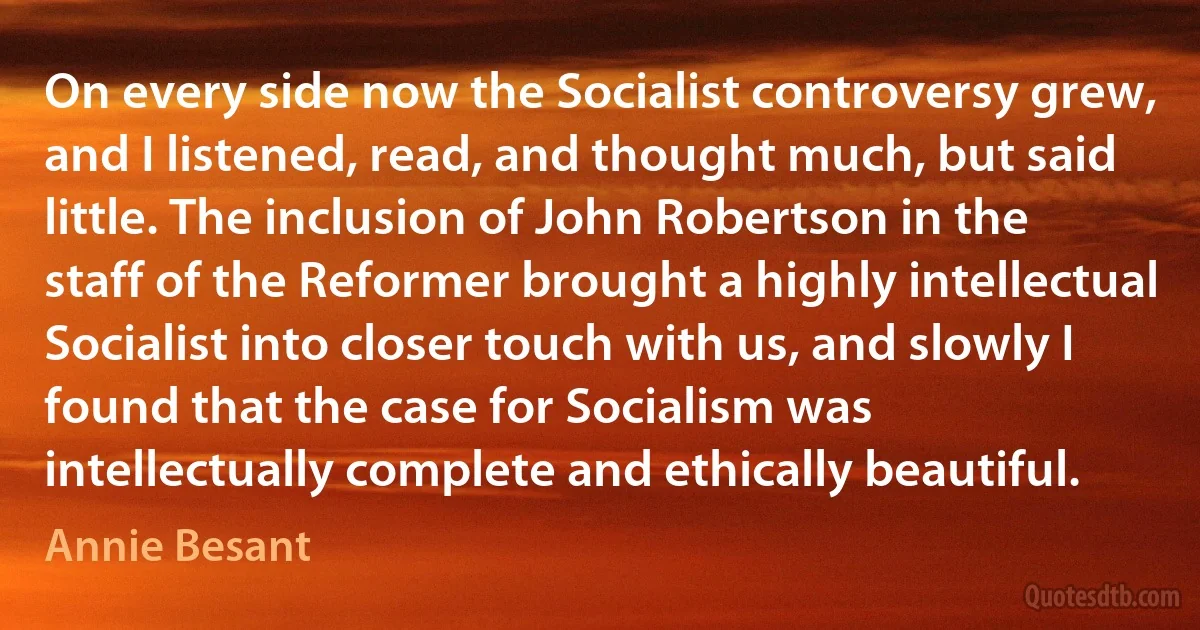Annie Besant quotes - page 7
For in the Spirit-World there is Reality; as the process of differentiation proceeds, illusion is produced, and it is this mind, this growing mind, that makes the illusion. It is this growing mind that has endless images and pictures, that has the image-making faculty which we speak of as imagination, that has the reasoning faculty which builds on the airy picture that it has made- it is this which is the real creator of illusion, it is this which slays the Real, so far as the disciple is concerned, and his first work as disciple will be to slay the slayer.

Annie Besant
The object of this book is to suggest certain lines of thought as to the deep truths underlying Christianity, truths generally overlooked, and only too often denied. The generous wish to share with all what is precious, to spread broadcast priceless truths, to shut out none from the illumination of true knowledge, has resulted in a zeal without discretion that has vulgarised Christianity, and has presented its teachings in a form that often repels the heart and alienates the intellect. The command to "preach the gospel to very creature” – though admittedly by doubtful authenticity – has been interpreted as forbidding the teaching of Gnosis to a few, and has apparently erased the less popular saying of the same Great Teacher "Give not that is holy unto the dogs, neither cast ye your pearls before swine.”.

Annie Besant
We were an ill-matched pair, my husband and I, from the very outset; he, with very high ideas of a husband's authority and a wife's submission, holding strongly to the 'master-in-my-own-house theory,' thinking much of the details of home arrangements, precise, methodical, easily angered and with difficulty appeased.

Annie Besant
The generous wish to share with all what is precious, to spread broadcast priceless truths, to shut out none from the illumination of true knowledge, has resulted in a zeal without discretion that has vulgarised Christianity, and has presented its teachings in a form that often repels the heart and alienates the intellect. The command to "preach the gospel to every creature” – though admittedly by doubtful authenticity – has been interpreted as forbidding the teaching of Gnosis to a few, and has apparently erased the less popular saying of the same Great Teacher "Give not that is holy unto the dogs, neither cast ye your pearls before swine.”.

Annie Besant
It is a difficult thing to tell the story of a life, and yet more difficult when that life is one's own. At the best, the telling has a savour of vanity, and the only excuse for the proceeding is that the life, being an average one, reflects many others, and in troublous times like ours may give the experience of many rather than of one. And so the autobiographer does his work because he thinks that, at the cost of some unpleasantness to himself, he may throw light on some of the typical problems that are vexing the souls of his contemporaries, and perchance may stretch out a helping hand to some brother who is struggling in the darkness, and so bring him cheer when despair has him in its grip. Preface.

Annie Besant
How strong were the feelings surging in my heart may be seen in a brief extract from an article published second week of January, 1885: "Christian charity? We know its work. It gives a hundred-weight of coal and five pounds of beef once a year to a family whose head could earn a hundred such doles if Christian justice allowed him fair wage for the work he performs. It plunders the workers of the wealth they make, and then flings back at them a thousandth part of their own product as 'charity.' It builds hospitals for the poor whom it has poisoned in filthy courts and alleys, and workhouses for the worn-out creatures from whom it has wrung every energy, every hope, every joy. Miss Cobbe summons us to admire Christian civilisation, and we see idlers flaunting in the robes woven by the toilers, a glittering tinselled super-structure founded on the tears, the strugglings, the grey, hopeless misery of the poor." Chapter XIII Socialism.

Annie Besant
The rules of the house were-and are-very simple, but H.P.B. insisted on great regularity of life; we breakfasted at 8 a.m., worked till lunch at 1, then again till dinner at 7. After dinner the outer work for the Society was put aside, and we gathered in H.P.B.'s room where we would sit talking over plans, receiving instructions, listening to her explanation of knotty points. By 12 midnight all the lights had to be extinguished. My public work took me away for many hours, unfortunately for myself, but such was the regular run of our busy lives. She herself wrote incessantly; always suffering, but of indomitable will, she drove her body through its tasks, merciless to its weaknesses and its pains. Chapter XIV Through Storm to Peace.

Annie Besant
We, who lived around her, who in closest intimacy watched her day after day, we bear witness to the unselfish beauty of her life, the nobility of her character, and we lay at her feet our most reverent gratitude for knowledge gained, lives purified, strength developed. O noble and heroic Soul, whom the outside purblind world misjudges, but whom your pupils partly saw, never through lives and deaths shall we repay the debt of gratitude we owe to you.

Annie Besant
In literature and in art, alike, this gloomy fashion of regarding Death has been characteristic of Christianity. Death has been painted as a skeleton grasping a scythe, a grinning skull, a threatening figure with terrible face and uplifted dart, a bony scarecrow shaking an hourglass – all that could alarm and repel has been gathered round this rightly-named King of Terrors. Milton, who has done so much with his stately rhythm to mould the popular conceptions of modern Christianity, has used all the sinewy strength of his magnificent diction to surround with horror the figure of Death.

Annie Besant
To me it seems that this very variety of experiences makes the tie stronger, not weaker, and that it is a rather thin and poor thing to know oneself and another in only one little aspect of many-sided humanity for endless ages of years; a thousand or so years of one person in one character would, to me, be ample, and I should prefer to know him or her in some new aspect of his nature. But those who object to this view need not feel distressed, for they will enjoy the presence of their beloved in the one personal aspect held by him or her in the one incarnation they are conscious of for as long as the desire for that presence remains.

Annie Besant
The most sacred duty is filial piety. "God showers his blessings on him who honors and reveres the author of his days,” says Pampelus (De Parentibus, Orelli, op. Cit., ii, 345). Ingratitude towards one's parents is the blackest of all crimes, writes Perictione ( ibid.,p. 350), who is supposed to have been the mother of Plato.

Annie Besant
But leaving aside disputes as to what may be to us "happiness” in a future separated from our present by millions of years, so that we are no more fitted now to formulate its conditions than is a child, playing with its dolls, to formulate the deeper joys and interests of its maturity, let us understand that, according to the teachings of the Esoteric Philosophy, the Devachanī is surrounded by all he loved on earth, with pure affection, and the union being on the plane of the Ego, not on the physical plane, it is free from all the sufferings which would be inevitable were the Devachanī present in consciousness on the physical plane with all its illusory and transitory joys and sorrows. It is surrounded by its beloved in the higher consciousness, but is not agonised by the knowledge of what they are suffering in the lower consciousness, held in the bonds of the flesh.

Annie Besant
In the victim's case the natural hour of death was anticipated accidentally, while in that of the suicide death is brought on voluntarily and with a full and deliberate knowledge of its immediate consequences. Thus a man who causes his death in a fit of temporary insanity is not a felo de se, to the great grief and often trouble of the Life Insurance Companies. Nor is he left a prey to the temptations of the Kāmaloka, but falls asleep like any other victim... The population of Kāmaloka is thus recruited with a peculiarly dangerous element by all the acts of violence, legal and illegal, which wrench the physical body from the soul and send the latter into Kāmaloka clad in the desire body, throbbing with pulses of hatred, passion, emotion, palpitating with longings for revenge, with un-satiated lusts.

Annie Besant
Over and over again he would be led by desire into excess, and each time he would experience the painful consequences, until at last he learned moderation, i.e., he learned to conform his bodily acts in this respect to physical law; for he found that there were conditions which affected him and which he could not control, and that only by observing them could physical happiness be insured. Similar experiences flowed in upon him through all the bodily organs, with undeviating regularity; his outrushing desires brought him pleasure or pain just as they worked with the laws of Nature or against them, and, as experience increased, it began to guide his steps, to influence his choice. It was not as though he had to begin his experience anew with every life, for on each new birth he brought with him mental faculties a little increased, and ever-accumulating store.

Annie Besant
That which we know as Yoga is the method by which evolution is quickened in the individual, and all the powers of the Self, up to the threshold of divinity, may by it be brought into manifestation in the man of the present. That is why Yoga training was necessary for the ancient scientist; he must develop in himself the three aspects of God, if he were to understand them as manifested in the universe around him. Now, at our own stage of evolution, it is specially the life of Brahmâ-or the Brahmâ aspect of God-with which the human mind is coming into touch, because the mind in man is the reflection of the universal mind in Kosmos. That life is the life that is the force in the atom, that vivifies every atom, nay, that brings the atom into existence, as we shall see, and remains during the whole of the growth of the universe as the fundamental life that keeps those atoms as active particles building up innumerable forms.

Annie Besant



